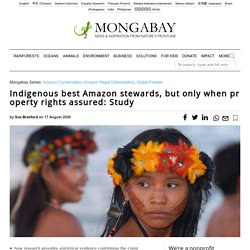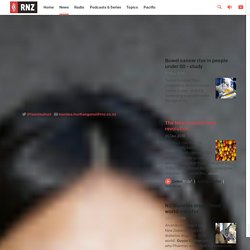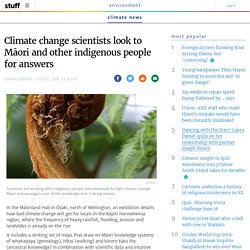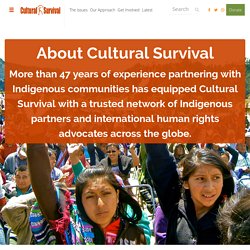

Indigenous best Amazon stewards, but only when property rights assured: Study. New research provides statistical evidence confirming the claim by Indigenous peoples that that they are the more effective Amazon forest guardians in Brazil — but only if and when full property rights over their territories are recognized, and fully protected, by civil authorities in a process called homologation.Researchers looked at 245 Indigenous territories, homologated between 1982 and 2016.

They concluded that Indigenous people were only able to curb deforestation effectively within their ancestral territories after homologation had been completed, endowing full property rights.However, since the study was completed, the Temer and Bolsonaro governments have backpedaled on Indigenous land rights, failing to protect homologated reserves. “The xapiri [shamanic spirits] have defended the forest since it first came into being.
Now Brazil’s Indigenous people have gained scientific backing for their strongly held belief from two American academics. Temer and Bolsonaro tip the tables. Bill curtailing indigenous land rights advances in Brazil's Congress. WATCH: Kyle Whyte and Jay Griffiths Discuss Indigenous Cultures and Climate Change ‹ Literary Hub.
Ihumātao. Maori & Sustainability. Māori vegans doing 'something good for the planet' Some Māori are urging whānau to improve their health by ditching dairy and meat - and embracing veganism.

Some of the vegan food showcased on the Vegan Māori Facebook page. Photo: Supplied / Vegan Maori The topic was at the centre of a recent New Zealand Human-Animal Studies conference, where researchers shared indigenous perspectives on plant-based diets. Katie Brown, who lives in Lower Hutt, said it was easy to make classic Māori dishes like hāngi or boil-up vegan. Boil-up - usually made by boiling pork bones in a broth with pūha or watercress - is a household favourite for many whānau. But Ms Brown's version comes with a twist. She blends together a mix of homemade vegetable stock, boiled kumara, potato, herbs, salt and pepper, and lots of watercress. Katie has ditched all meat, seafood, and dairy products. She stopped eating red meat when her father contracted bowel cancer, and became fully vegan this year. Her father died in 2016. But health benefits are not the only reasons to turn vegan. Indigenous ways of knowing and the study of environmental change .pdf.
Climate change scientists look to Māori and other indigenous people for answers. In the Māoriland Hub in Ōtaki, north of Wellington, an exhibition details how bad climate change will get for locals in the Kāpiti Horowhenua region, where the frequency of heavy rainfall, flooding, erosion and landslides is already on the rise.

It includes a striking set of maps that draw on Māori knowledge systems of whakapapa (genealogy), hīkoi (walking) and kōrero tuku iho (ancestral knowledge) in combination with scientific data and intuitive design, to show what the local landscape will look like 30 and 100 years from now. It's part of a Massey University project co-led by Professor Huhana Smith (Ngāti Tukorehe, Ngāti Raukawa ki Te Tonga) that aims to combine knowledge from Māori researchers, architects, artists and scientists. Huhana explains that climate change is not being communicated in a way that relates to the Māori communities who are most at risk from its impacts. Science meets mātauranga "We had to decide the most important questions to cover," he says. Why the rāhui? The world’s indigenous communities. Cultural survival organisation. Board of Directors Duane Champagne (Turtle Mountain Band of Chippewa), President Steven Heim, Vice-President Jason Campbell (Spokane), Treasurer Nicole Friederichs, Clerk Evelyn Arce Erickson Kaimana Barcarse (Native Hawaiian) Jason Campbell (Spokane) Laura Graham Ajb’ee Jiménez (Mam Maya) Lesley Kabotie (Crow) John King Stephen Marks Tui Shortland (Māori) Stella Tamang (Tamang) Staff Mark Camp, Interim Executive Director Maria Eugenia "Maru" Chavez, Indigenous Rights Radio Program Manager Jessie Cherofsky, Bazaar Program Manager Avexnim Cojti (Maya K’iche’), Community Media Program Manager Danielle DeLuca, Advocacy Program Manager Shaldon Ferris (Khoisan), Indigenous Rights Radio Producer Sofia Flynn, Accounting & Office Manager Nati Garcia (Maya Mam), Indigenous Youth Community Media Fellowship Coordinator Cesar Gomez (Pocomam), Community Media Program Coordinator Adriana Hernández (Maya K'iche'), Executive Assistant Bia’ni Madsa’ Juárez López (Mixe/Zapotec), Keepers of the Earth Fund Project Manager.
